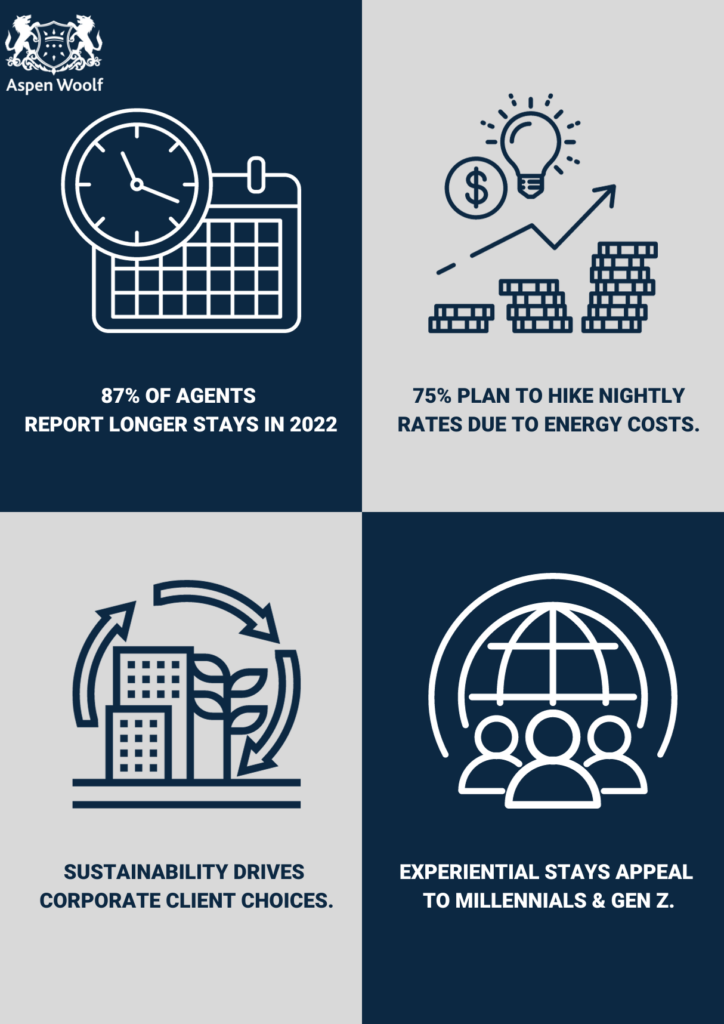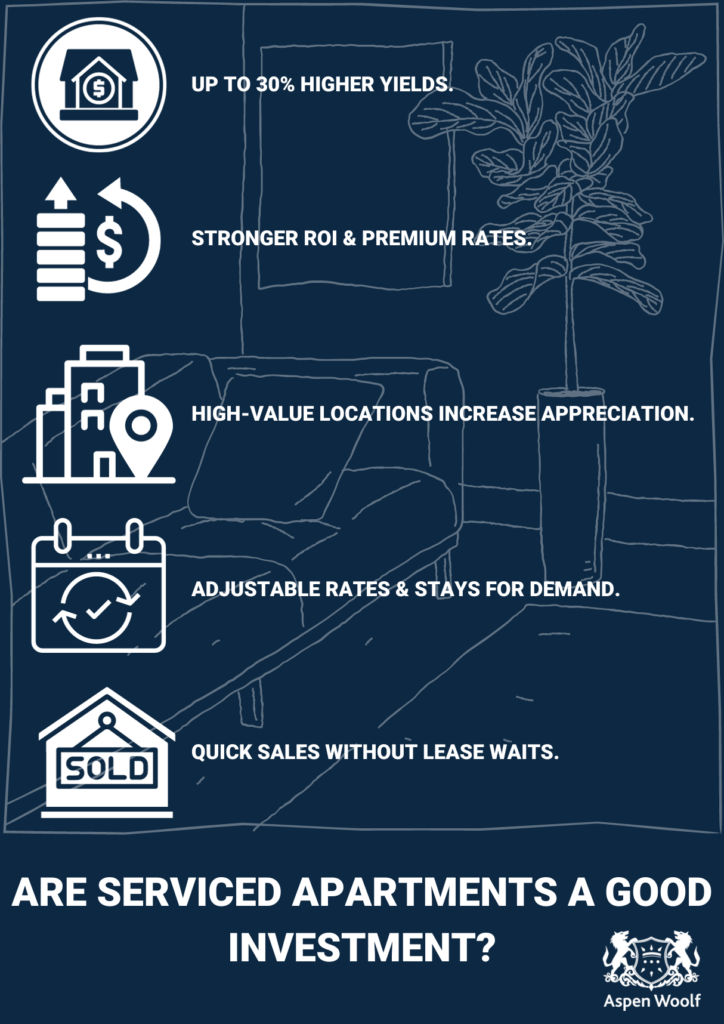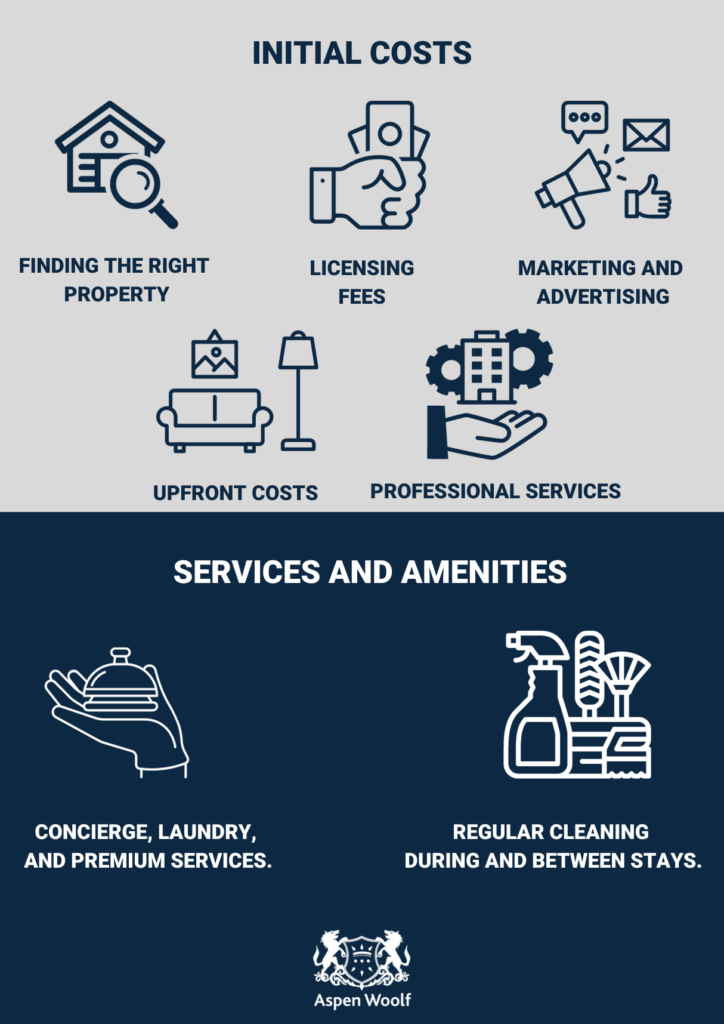Serviced Accommodation: Lucrative Opportunity in the Property Market?

Serviced accommodation is a relatively new property investment category, but one that might appeal to investors thanks to its potential for excellent rental returns.
The UK is Europe’s largest serviced accommodation market and growing in size and popularity.
As work, travel and living preferences evolve, the serviced accommodation sector has emerged as a compelling option. Namely for business travellers and tourists seeking comfort, convenience and a home away from home.
In this article, we take a look at the serviced accommodation market in the UK, the pros and cons and recent trends so inventors can get to grips with this new but exciting sector of the rental market.
Serviced Accommodation: An Overview
What is a serviced accommodation?
Serviced accommodation combines the amenities and services of a hotel with the benefits of a fully furnished apartment. Blending comfort and privacy with convenience and a prime location, serviced accommodation is becoming increasingly popular amongst business travellers, tourists and those looking for longer stays.
What are serviced apartments?
Typically rented out for short to medium-term stays, serviced apartments usually include a kitchen, bedroom and living area with add-ons like housekeeping and concierge services and facilities like coworking spaces.
Here are some of the aspects that make serviced accommodation appealing:
- Fully Furnished: Serviced apartments come equipped with all the furniture, appliances and amenities found in a typical home, making them a more comfortable alternative to hotel rooms.
- Housekeeping: Regular cleaning and housekeeping services ensure that the apartment stays clean and well-maintained during the guest’s stay, which is particularly appealing to busy business or corporate travellers.
- Security: Serviced apartments often have security features similar to hotels, such as 24-hour reception, key card access and surveillance.
- Flexible Length of Stay: Guests can book serviced apartments for a few nights, several months or anything inbetween, making them suitable for both short-term and extended stays.
Why Are Serviced Apartments Becoming More Popular?
The shift towards remote work and flexible working arrangements has impacted the nature of business travel. Professionals no longer need to adhere to rigid schedules, and this flexibility has led to extended stays in various locations.
Serviced apartments have emerged as a preferred choice for workers and travellers because they offer the convenience of a home away from home and provide a level of comfort and autonomy that traditional hotels may not offer.
Younger generations, specifically millennials and Gen-Z, have distinctive preferences when it comes to work, travel and accommodation. They look for experiences that align with their values of flexibility, community and convenience and serviced apartments have tapped into this demand by offering co-living and co-working concepts.
Serviced apartments cater to a diverse range of guests beyond business travellers or younger guests. Students seeking temporary accommodation, individuals relocating to a new city and professionals working abroad can all be a target demographic.
Trends in the UK Serviced Accommodation Sector
The pandemic sparked a surge in interest in serviced apartments, driven by the growing demand for extra space and flexibility. Post-Covid, the popularity of serviced apartments in the UK market remains, with many new brands arriving on the scene.
The Dominant Market in Europe
According to Savills, the UK remains Europe’s most dominant serviced apartment market, accounting for a 47% share in 2021. By the end of 2022, the UK serviced apartment sector was forecast to grow to over 27,000 units, with annual growth in supply forecast at 5.7%. 70% of the new supply is set to be delivered by independent operators.
Steady Growth
According to The 2023 Global Serviced Apartment Industry Report (GSAIR), serviced apartment usage has grown for the 10th consecutive year. There are currently 3,000 new serviced apartment units under construction in the UK. Another 6,000 have secured final planning, and London accounts for one-third of this pipeline.
New Opportunities for Investors
Corporate usage of served apartments has grown by 53% for business travel, 38% for assignment work and 89% for relocation. 20% of bookings are now for leisure travel, showing new opportunities to target a growing demographic.
What Does this mean for investors? The serviced apartment model is well established, and with the UK’s dominant position and the sector’s projected growth, there is a growing demand for serviced accommodation.
Key Trends in the Serviced Apartment Market
2022 saw a number of trends impacting the serviced accommodation UK market that investors should be aware of in order to make the most of any investment opportunity.

Longer Stays
An increase in the length of the average stay was reported by 87% of serviced apartment agents in 2022. Longer guest stays typically lead to increased revenue stability, lower operating costs and potentially higher returns on investment.
Rising energy costs
Additional energy costs have meant that 75% of operators are planning to charge higher nightly rates. Higher nightly rates can translate to increased revenue potential for investors, but rising energy costs can put pressure on operating expenses, affecting profit margins.
Importance of Sustainability
Greater awareness amongst business travellers means sustainability influences the choice of serviced apartments for corporate clients. Investors with properties that have strong sustainability credentials are likely to see increased demand, and this can help them stand out in a competitive market.
Cafes and Coworking
Millennials and Gen Z travellers are looking for more experiential stays, leading serviced accommodation brands to organise events and create communal spaces. To attract this type of guest, investors should consider the experiential features offered within their service apartment building or in the local area.
Are Serviced Apartments a Good Investment?
With the rising popularity of serviced accommodation, property investors should look closely to see if serviced apartments will align with their investment goals. Compared to residential property, serviced apartments usually have shorter leasing durations, but can yield higher returns in peak periods, enhancing their profitability.
Here are some of the other benefits of investing in serviced accommodation:

Higher Rental Income
Serviced accommodation allows investors to charge higher fees compared to traditional buy-to-let properties. Short-term rentals are generally more profitable, attracting up to 30% higher yields.
Better Returns
When managed well, a serviced accommodation investment can yield strong returns on investment. The ability to charge premium rates, coupled with shorter vacancy periods can contribute to a stronger ROI when compared to other property types.
Capital Appreciation
The potential for capital appreciation in well-located properties can enhance overall returns for an investor. Apartments located in tourist destinations or business hubs can offer investors good opportunities for appreciation.
Flexibility
Serviced accommodation provides greater flexibility. Investors can adjust the length of stay and pricing to cater to various guest needs and times of year. Seasonal rate adjustments in periods of high demand like in the summer tourism months or when popular events take place, mean investors can increase rental rates.
Faster Sale
Unlike residential property, selling serviced accommodation can be quicker and easier as you don’t need to wait for the end of a fix-term tenancy. The ability to sell when you want means investors can make the most of market conditions to sell at an optimum time.
Drawbacks of Serviced Apartments
Looking at the other end of the equation, serviced apartments do come with potential drawbacks that investors need to be aware of.
Higher Costs:
Setting up serviced accommodation often involves significant upfront costs, including purchasing the property, renovation, furnishing expenses and marketing costs. While property management companies can help with the day-to-day operations, they also charge a percentage fee of the rent generated which can eat into your rental income.
Longer Void Periods:
Depending on the location, serviced apartments can experience significant periods without tenants. Investors will still need to cover the ongoing costs of properties and income may be inconsistent.
Wear and Tear:
With a higher turnover of guests, higher wear and tear or damage to furniture is to be expected. In addition, frequent cleaning and maintenance can add to operational costs.
More Complex:
Serviced apartments are more operationally complex than traditional rentals. Handling guest bookings, cleaning and maintenance can make this time-consuming and challenging for investors. Investors also need to pay attention to different regulations.
Investing in Serviced Accommodation: The Practicals
Investing in serviced accommodation involves a range of practical considerations that investors should be aware of to make informed decisions. Here are some key aspects that investors should consider:

Initial Costs
- Finding the right property: The cost of finding and purchasing a property suitable for serviced accommodation can vary depending on location and may be more expensive and time-consuming than a regular residential property.
- Upfront costs: Serviced accommodation incurs upfront expenses to prepare the property for guests, including furniture, appliances and decor and making sure the property is appealing to the right demographic. For example, business travellers may appreciate a dedicated working area, while a better-equipped kitchen may be more important for tourists.
- Licensing Fees: There are additional costs associated with complying with local regulations and obtaining necessary permits for the property to be rented out to guests as a serviced apartment.
- Marketing and advertising: Investors will need to budget for promoting their serviced accommodation through online platforms and advertising channels.
- Professional Services: Expenses for property inspections, legal advice and potentially hiring a property management company will need to be considered.
Services and Amenities
- Investors will need to determine the amenities and services they will provide, such as concierge and laundry services or other more premium offerings.
- Investors will need to arrange housekeeping and cleaning arrangements during and between guest stays and manage the associated costs.
Investing in Serviced Accommodation in the UK
With tourists and business stay travellers the main market for serviced apartments, London is a popular investment location among investors. London is one of the best areas for serviced accommodation UK and the biggest growth market with 3,000 units in the pipeline, a 26% increase on current stock levels.
While the best areas to invest in serviced accommodation in London can vary based on your goals, target audience and budget, here are some areas to consider:
- City of London: London’s financial district and is popular with business travellers and serviced apartments can yield high returns due to the constant demand from corporate visitors.
- Covent Garden: Covent Garden attracts tourists with its diverse restaurants and attractions, making it a prime location for short-term rentals focused on tourist travellers.
- Canary Wharf: Another financial district, Canary Wharf is a hotspot for business travellers and serviced apartments in this area can yield consistent demand.
Management Options for Serviced Apartments
Serviced accommodation management presents a challenge due to the frequent turnover of guests, the ongoing upkeep of the property, housekeeping schedules, effective marketing and booking management and unforeseen events.
Many investors opt to delegate some or all management responsibilities to property management companies. While self-managing a property means you avoid management fees, it requires substantial time and effort as investors have to control all aspects of managing the apartment from guest communication to bookings to cleaning to maintenance.

Property Management Services
Serviced accommodation management companies have expertise in managing serviced accommodation, which means that you can outsource end-to-end management of guest communication, maintenance and marketing.
Ideal for investors looking for an off-hand approach or those seeking to scale multiple properties, serviced accommodation companies typically charge a management fee that is a percentage of the rental income.
Online Booking Platforms
Booking platforms like Airbnb or Booking.com are another way for inventors to manage their property. Investors will still need to handle guest interactions and maintenance. But they will benefit from the marketing exposure of these platforms which charge a commission on each booking.
Do you Pay Tax on Serviced Accommodation?
Serviced accommodation is still liable for tax. Meaning, you’ll still need to pay taxes on income generated from serviced accommodation in the UK. Some of the specific taxes you may be liable for include:
- Income Tax: Income generated from serviced accommodation is subject to income tax. Investors will need to report this income on their annual self-assessment tax return. As well as pay tax on any profits after deducting allowable expenses.
- Value Added Tax (VAT): Residential lets are usually exempt from VAT but if you supply serviced accommodation the VAT rate of 20% may apply.
- Business Rates: Depending on the nature of a property, you may be liable for business rates instead of, or in addition to, council tax. Business rates are charges that are taken to help pay for local services and must be paid on most properties that are used commercially rather than domestically.
- Capital Gains Tax: If you sell a serviced accommodation property, you may be liable for Capital Gains Tax on any profit made from the sale. There are specific rules and exemptions that can apply to the sale of properties. So it’s essential to understand the tax implications.
- Local Taxes: Depending on the local authority and regulations, you may need to pay additional local taxes. As well as fees related to your serviced accommodation.
Is Serviced Accommodation Residential or Commercial?
In the UK, various factors determine whether we classify serviced accommodation as residential or commercial. “Serviced accommodation” is a term used to encompass purpose-built apartments and residential buildings. As well as apartments listed for short-term let on platforms like Airbnb.
We distinguish between residential and commercial properties by their intended use. Residential properties are designed for living, while commercial properties are designed for business. However, local authorities may have their own regulations and definitions. This means the property owner’s specific usage and intentions can influence how it’s classified.
Many hospitality companies or brands operate a significant portion of serviced accommodation. They rent them out on a daily, weekly, or monthly basis, much like hotels. When dealing with a purpose-built apar-hotel, your mortgage for serviced accommodation will need to be a commercial mortgage. This is because a standard buy-to-let mortgage isn’t suitable.
Conclusion
The serviced accommodation market in the UK offers a compelling opportunity for investors seeking strong rental returns in a fast-moving sector. Catering to the preferences of modern travellers and business professionals, serviced accommodation is a promising segment of the property market. While it presents challenges such as upfront costs and operational complexity, the potential for serviced accommodation to deliver higher rental income, better returns and adaptability to market trends make it a lucrative avenue. To find out more if investing in the serviced apartment sector is right for you, get in touch with our experts.

